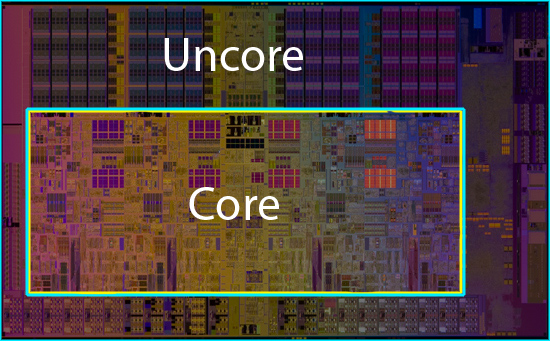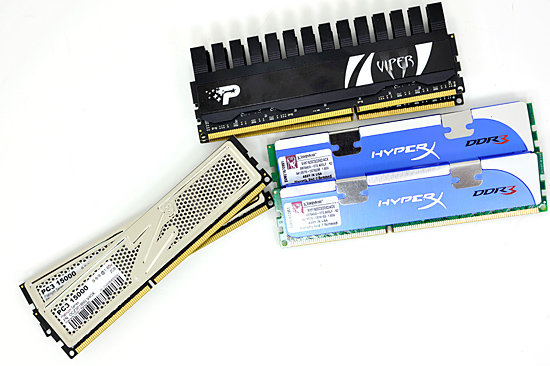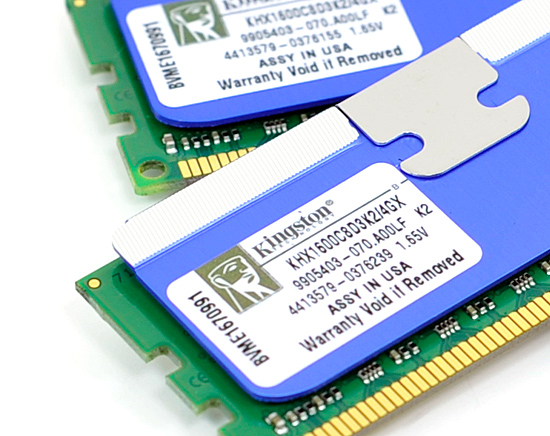Intel's Core i7 870 & i5 750, Lynnfield: Harder, Better, Faster Stronger
by Anand Lal Shimpi on September 8, 2009 12:00 AM EST- Posted in
- CPUs
Lynnfield's Un-Core: Faster Than Most Bloomfields
A few years ago I had a bet going with AMD's Ian McNaughton. We were at an AMD event where the Phenom architecture was first being introduced and he insisted that the L3 cache was part of the memory controller. This didn't make any sense to me so I disagreed. Minutes later a presentation slide went up on a projector talking about how the L3 cache and memory controller were on the same voltage plane; that's what he meant. Ian laughed a lot and to this day he holds it over my head.
The moral of the story is in Phenom and later in Nehalem, the processor is divided into two parts. Intel named them the core and the un-core. The "core" of these multi-core processors is made up of each individual processor core and its associated private caches (L1/L2). The "uncore" refers to everything else: PCIe controller, memory controller, DMI/QPI and the L3 cache.

The uncore isn't as critical for performance but is made up of a ton of transistors; roughly 400 million in the case of Lynnfield/Bloomfield (more if you count the PCIe controller). In order to save power, Intel uses slower transistors that have lower leakage for the un-core. As a result, the un-core can't clock up as high as the core and runs at a lower multiplier.
Take the Bloomfield Core i7 975 for example. The core runs at 25x BCLK (25 x 133MHz = 3.33GHz), but the un-core runs at 20x BCLK (20 x 133MHz = 2.66GHz). The rest of the chips, including Lynnfield, have slower un-cores:
| CPU | Socket | Core Clock | Un-Core Clock |
| Intel Core i7 975 Extreme | LGA-1366 | 3.33GHz | 2.66GHz |
| Intel Core i7 965 Extreme | LGA-1366 | 3.20GHz | 2.66GHz |
| Intel Core i7 950 | LGA-1366 | 3.06GHz | 2.13GHz |
| Intel Core i7 940 | LGA-1366 | 2.93GHz | 2.13GHz |
| Intel Core i7 920 | LGA-1366 | 2.66GHz | 2.13GHz |
| Intel Core i7 870 | LGA-1156 | 2.93GHz | 2.40GHz |
| Intel Core i7 860 | LGA-1156 | 2.80GHz | 2.40GHz |
| Intel Core i5 750 | LGA-1156 | 2.66GHz | 2.13GHz |
Here's another area where Lynnfield is better than the lower end Bloomfields: its uncore runs at 2.40GHz instead of 2.13GHz. The exception being the Core i5 750, its uncore is stuck at 2.13GHz as well. Once again, only the "Extreme" Bloomfields have a faster uncore.
Lynnfield's Memory Controller: Also Faster than Bloomfield
Intel only officially supports two memory speeds on Bloomfield: DDR3-800 and DDR3-1066. Obviously we're able to run it much faster than that, but this is what's officially validated and supported on the processors.
Lynnfield is a year newer and thus gets a tweaked memory controller. The result? Official DDR3-1333 support.

Three Lynnfield memory kits (left to right): OCZ, Patriot and Kingston
The same sort of rules apply to Lynnfield memory kits that we saw with Bloomfield. You don't want to go above 1.65V and thus all the kits we've seen run at 1.5V for the stock JEDEC speeds or 1.65V for the overclocked modules.

Like Bloomfield, 1.65V is the max we'll see on Lynnfield










343 Comments
View All Comments
Jamahl - Tuesday, September 8, 2009 - link
Digusting! How much money did intel bung you for this disgrace?strikeback03 - Tuesday, September 8, 2009 - link
How is that disgusting? It is the stock configuration of the processor. They are not doing all this testing as an e-pissing contest of who has better performance per clock, it is a comparison of retail products in real-world applications. If (and according to the review, when) AMD has something similar, I'd imagine they will test with that turned on too.Jamahl - Tuesday, September 8, 2009 - link
Why not benchmark the Phenom 2 with fusion for gaming anand???Gary Key - Tuesday, September 8, 2009 - link
"Why not benchmark the Phenom 2 with fusion for gaming anand??? "Have you actually tried using Fusion with Windows 7 x64? It is a total mess. I will be happy to show some results with it, most will say DNF, but that might not make you happy. ;) That said, AMD is working on it, especially trying to get it to play nice with AOD.
In the meantime, here is the current list of items to watch out for - http://game.amd.com/us-en/drivers_fusion.aspx?p=3&...">http://game.amd.com/us-en/drivers_fusion.aspx?p=3&... .
Jamahl - Tuesday, September 8, 2009 - link
What? It's AMD's fault that an unreleased 64-bit os is causing issues with their software?How many people are using Window 7 64 bit who visit this website?
Gary Key - Tuesday, September 8, 2009 - link
It is just as bad in 64-bit Vista. I imagine a fair amount of people that visit the site are using the RTM version of Win7.Jamahl - Tuesday, September 8, 2009 - link
were you benchmarking a processor at 2.66 gigahertz or a processor at 3.2 gigahertz?Gary Key - Tuesday, September 8, 2009 - link
Do you and SnakeOil live in the same house or is the IP address just that similar? LOL.. The processors were benched as they come out of the box. For Lynnfield that means turbo was on as we stated in the article and here in the comments. For Bloomfield, that also means turbo was on, just as it comes out of the retail box.If you check all the other reviews on the web at the main sites, everyone tested with turbo on in the primary benchmarks. So I guess you can say there is a huge conspiracy between us to actually utilize the processors as Intel intended for the users.
Apparently, we all failed at covering it up, so congratulations on discovering the Freeturbomasons. A now not so secret fraternal organization bent on world domination through the use of turbo frequencies inside processors carrying the blue "i" logo.
For the AMD Phenom II x4 series, they were benched with all cores enabled just as they come out of the box, even though you can disable each core in the BIOS just like you can disable turbo on the i7/i5. I guess to make things fair, we should disable the cores on the 965 BE as having that "feature" turned on is cheating.
Anyway, thanks for making my day, I needed some much deserved laughter. :)
Chlorus - Tuesday, September 8, 2009 - link
Seeing as how Fusion isn't even out yet, that would be hard to do...go troll somewhere else. What is with the idiots coming out of the woodwork on this post? You've got the standard fanboys, as well as insecure LGA-1366 owners who feel the need to defend their purchase, and insecure purchasers of 1156 products who are afraid their choice might be bested in a benchmark somewhere.Roland00 - Tuesday, September 8, 2009 - link
Would you please rerun page 9 with an overclocked 975 and the 870. I am wondering how much the difference will grow when the gpus are fed more information due to the faster cpus. Something like 3.8 to 4.0 ghz on both cpus with turbo off (a good overclock yet not in the unreasonable area)If you are investing 400+ dollars in gpus, and you are building it yourself you are probably going to overclock.